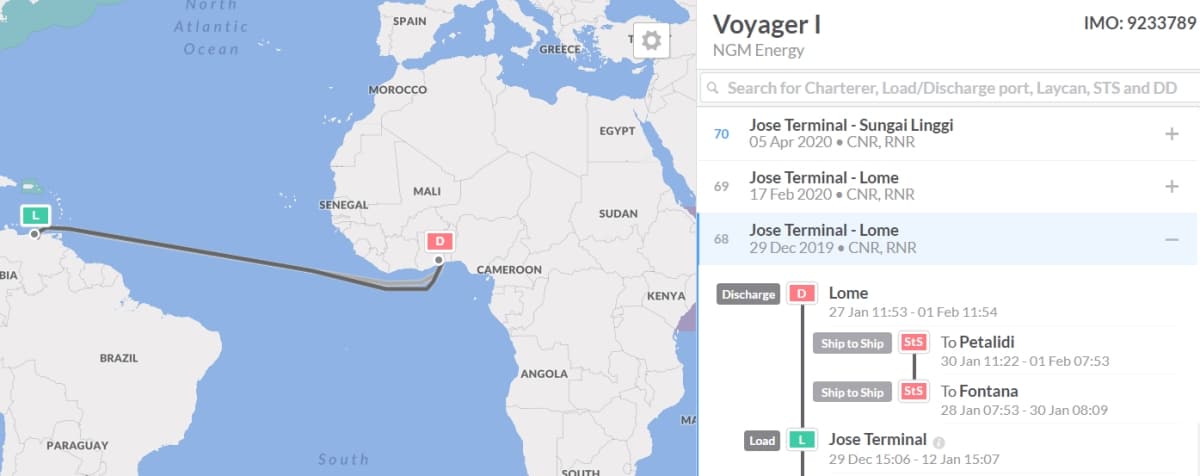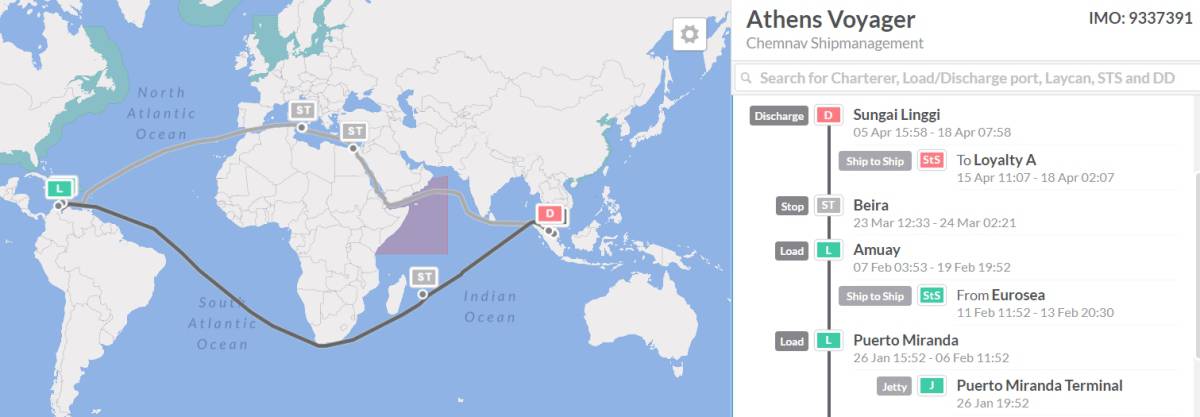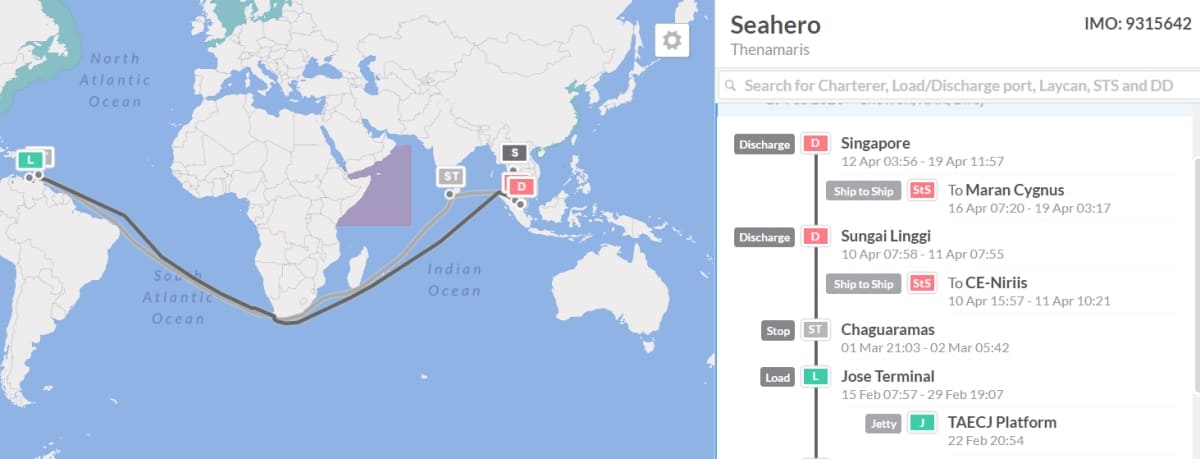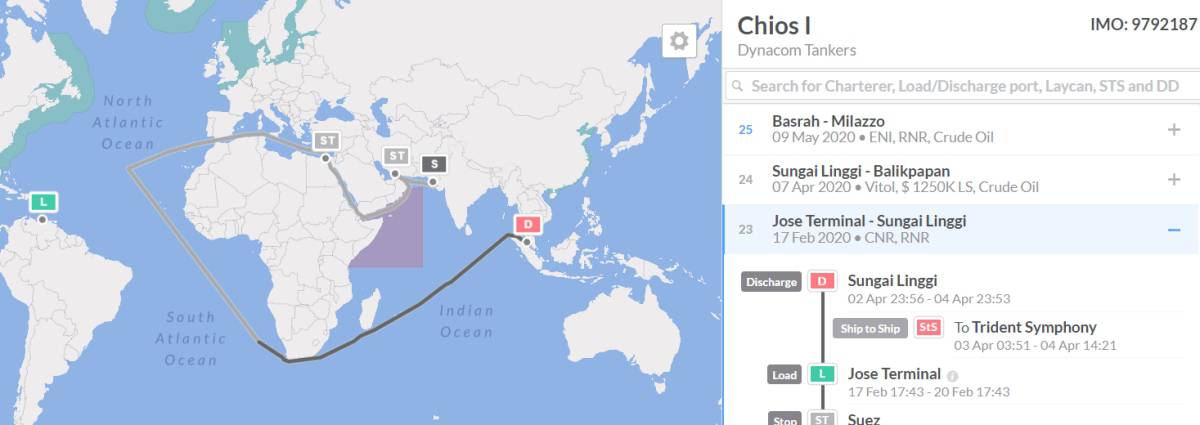U.S. sanctions had a huge impact on crude-tanker supply and spot rates in 2019, when the tankers of China’s COSCO (Dalian) were sidelined after carrying Iranian crude. Will it happen again in 2020, courtesy of Venezuela?
The Treasury Department’s Office of Foreign Assets Control (OFAC) announced Tuesday that it had sanctioned four tankers and their operating companies because they loaded crude oil for export in Venezuela.
Sanctioned ships include two very large crude carriers (VLCCs; tankers that carry 2 million barrels of crude oil), one Suezmax (a tanker carrying 1 million barrels) and one Aframax (750,000 barrels) that loaded in Venezuela over the past three months.
All four are commercially managed out of Greece. Data provided to FreightWaves by Signal Ocean shows that the crude was shipped from Venezuela to China through transport operations involving one or more ship-to-ship (STS) transfers. Almost all of the STS operations loaded the Venezuelan crude onto other tankers managed by Greeks — including some very big names in the industry.
Tanker supply implications
If OFAC targeted every tanker that loaded crude in Venezuela, as well as those that carried cargoes on second legs after STS operations, it would be a long list.
Any ship and its operating company hit by Venezuela sanctions is put on the U.S. Specially Designated Nationals (SDN) list and cannot do business in U.S. dollars. Blocked ships cannot call at U.S. ports. Furthermore, any business that is at least 50% owned by an entity on the SDN list is also blocked.
Given the steep business consequences of being placed on the SDN list (most tanker deals are transacted in U.S. dollars), international shipowners could be compelled to cease serving Venezuela.
Asked about the broader tanker supply consequences, one industry source who declined to be identified told FreightWaves, “It could be absolutely no big deal or COSCO Part Two.” If it’s just the four tankers, no big deal; if sanctions extend beyond the single-ship holding companies and affect the commercial operators linked to those ships, COSCO Part Two.
Jefferies analyst Randy Giveans told FreightWaves, “We saw the same thing with the China COSCO sanctions back in October 2019 as a result of the tankers doing business with Iran. This time, the tankers are being sanctioned for doing business with Venezuela.
“Although this is a smaller scale and less important that the China COSCO sanctions, these new sanctions are a positive headline for the U.S.-listed public tanker companies as it reduces the number of competing vessels in the market,” said Giveans.
According to Frode Mørkedal, managing director of research at Clarksons Platou Securities, “Naturally, there is concern that other ships and owners may be at risk for similar sanctions.”
He said that vessel-tracking data shows calls in Venezuela over the last six month by 23 VLCCs, 17 Suezmaxes, 35 Aframaxes, three Panamaxes (tankers with capacity of 55-79,999 deadweight tons or DWT) and 30 product tankers. The crude and product tankers serving Venezuela have a total aggregate capacity of 15.2 million DWT, or 2.6% of the global tanker fleet. Consequently, Mørkedal believes that “a more stringent sanctions regime could be significant for tanker earnings.”
Four tankers snared
The sanctioned vessels are:
Athens Voyager — According to OFAC, the registered owner is Afranav Maritime of the Marshall Islands. According to data provided to FreightWaves via the Signal Ocean platform, the ship is a 105,614-DWT Aframax tanker commercially operated by Chemnav Shipmanagement.
Chios 1 — Registered owner: Greece’s Seacomber Ltd. According to Signal Ocean, a 149,999-DWT Suezmax commercially operated by Dynacom Tankers.
Seahero — Registered owner: Marshall Islands company Adamant Maritime; a 306,507-DWT VLCC commercially operated by Thenamaris, according to Signal Ocean. (The founder of Signal Ocean, Ioannis Martinos, is the brother of Nikolas Martinos, the CEO of Thenamaris).
Voyager 1 — Registered owner: Sanibel Shiptrade of the Marshall Islands; according to Signal Ocean, a 309,233-DWT VLCC commercially operated by NGM Energy.
Why OFAC sanctioned ships
OFAC said the sanctioning of the tankers was done pursuant to Executive Order 13850, as amended. That order originally targeted Venezuela’s gold sector. It was amended in January 2019 to apply to Venezuelan oil company PDVSA.
OFAC said the new tanker sanctions “further target Venezuela’s oil sector, which continues to provide financial resources to the illegitimate regime of President [Nicolas] Maduro.”
According to Treasury Secretary Steven Mnuchin, “The illegitimate Maduro regime has enlisted the help of maritime companies and their vessels to continue the exploitation of Venezuela’s natural resources for the regime’s profit. The United States will continue to target those who support this corrupt regime.”
The U.S. government’s statements seem to imply that any tanker that loads or has loaded crude in Venezuela, or that has aided in the transport operations, is at risk of losing access to the U.S. currency system for its transactions, and the ability to call in the U.S., and do business with U.S. entities.
The plot thickens …
Signal Ocean data offers further details on the sanctioned ships’ voyages and on who else was allegedly involved in the transport of Venezuelan crude to Asia via one or more STS operations.
Voyager 1 — The VLCC loaded at Venezuela’s Jose terminal on Dec. 29, 2019, and Feb. 17 and April 5, 2020. On the first voyage, the Signal Ocean data shows the Voyager 1 conducting STS transfers in Togo, West Africa to the Suezmaxes Fontana and Petalidi; on the second voyage, the data shows an STS transfer in Togo to the VLCC Solana. The tankers that took the crude then either headed to Sungai Lingii, an STS facility off the coast of Malaysia, and from there to China, or directly to China. On the third voyage, there was no STS transfer; the Voyager 1 brought the crude directly to Sungai Lingii.
The Fontana, Petalidi and Solana are all commercially managed by Cardiff Marine, a company founded by Greek shipowner George Economou, who also founded the formerly public company DryShips, which was brought private last year.

Athens Voyager — The Aframax loaded crude at Venezuela’s Puerto Miranda on Jan. 26, was involved in an STS from the Panamax tanker Eurosea (operated by Greece’s Eurotankers) two weeks later, then loaded at Venezuela’s Amuay refinery on Feb. 7 and sailed toward Sungai Lingii, where it arrived in April; it transferred some of its cargo to the Aframax Loyalty A (operated by Singapore’s Nathalin), which discharged in China, according to Signal Ocean’s data.

Seahero — The Thenamaris-managed VLCC loaded at Jose Terminal on Feb. 15 and conducted STS operations in both Sungai Lingii and Singapore, with the Aframax CE-Niriis, operated by Greece’s Centrofin, and Maran Cygnus, a VLCC operated by Maran Tankers, according to Signal Ocean data. Maran is one of the largest tanker companies in the world, run by Greek shipping magnate John Angelicoussis.

Chios I — The Suezmax loaded at Venezuela’s Jose Terminal on Feb. 17 and sailed to Sungai Lingii, where the Signal Ocean data indicates it conducted an STS transfer of its cargo to the Trident Symphony, operated by Turkey’s Medship Shipping and Trading; the Trident Symphony went on to unload in China.

The Signal Ocean platform also shows multiple tankers currently loading at Jose Terminal in Venezuela, including the VLCC Respect, operated by NGM Energy — the same company operating the just-sanctioned Voyager 1 — and the Suezmax Delta Med, operated by Greece’s Delta Tankers. Click for more FreightWaves/American Shipper articles by Greg Miller









Jose Rivas
The US time is coming to an end soon….they are trying to control the whole world to benefit only the white extremist that are under control of the government……China…Russia..India….are the new powers and the US CURRENCY is taking a big hit now over surging alternatives…NO TO INTERVENTIONS in Sovereign nations….leave them take care of their own business…No more gringos